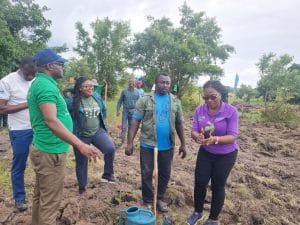Ecobank Ghana’s Commitment to Environmental Stewardship
Ecobank Ghana has shown remarkable dedication to environmental conservation by concluding its 2025 World Environment Day activities with the planting of approximately 1,700 trees at the Chipa Forest Reserve in Dodowa, Accra. This initiative is part of a broader effort to restore degraded ecosystems and promote sustainable development across the country.
In partnership with the Forestry Commission, Ecobank has successfully planted a total of 4,500 trees this year. These efforts include the planting of 2,800 trees at 27 schools and hospitals spread across five regions of Ghana. The project aligns with the government’s ‘Tree for Life’ initiative, which aims to address the damage caused by illegal logging and land encroachment. Over the next two weeks, about 1,700 trees will be planted on two hectares of degraded land within the Chipa Forest Reserve.
This initiative reflects the bank’s long-term commitment to environmental stewardship and its shift toward large-scale, sustainable ecological restoration. While World Environment Day is celebrated globally on June 5 each year, the government of Ghana dedicated both June and July to mark this year’s observance.
Expanding the Impact of Tree Planting
Ecobank’s 2025 World Environment Day activities extended beyond the Chipa Forest Reserve. The bank participated in the official launch and commemorative tree planting at the Kwabenya Community Senior High School on June 5. Additionally, it joined a special tree-planting event organized by members of the Diplomatic Corps and heads of selected institutions at the Achimota Forest Reserve on June 20.
Dr. Daniel Kasser-Tee, Head of Corporate Affairs at Ecobank Ghana, spoke on behalf of Tara Squire, Executive Director of Ecobank Ghana, during the event at the Chipa Forest Reserve. He emphasized the bank’s commitment to supporting environmental sustainability in Ghana.
“Today, Ecobank is opening a new chapter,” Dr. Kasser-Tee stated. “We are moving beyond ceremonial plantings to actively reclaiming damaged ecosystems. Our focus on afforestation stems from the undeniable fact that forests are a powerful tool for environmental restoration and sustainable development.”
Benefits of Tree Planting
Dr. Kasser-Tee highlighted the numerous benefits of environmental restoration, including the creation of habitats for biodiversity, improved soil fertility, prevention of erosion, and enhanced water retention. He stressed the importance of prioritizing these efforts.
He also pointed out that a single mature tree can supply oxygen for up to four people daily and absorb 13 pounds of carbon annually. According to him, tree planting is essential in combating climate change. Furthermore, it offers economic and social benefits such as job creation, improved living standards, and opportunities for tourism.
“This is core to Ecobank’s identity as the largest Pan-African banking institution,” Dr. Kasser-Tee said. He noted that the bank is also reducing its operational carbon footprint through sustainable supply chains, energy-efficient buildings equipped with solar panels, and digital financial inclusion initiatives that promote paperless banking.
Collaboration with Local Authorities
Mrs. Linda Zuri Ansah, District Manager of the Tema/Ada Forest District, welcomed Ecobank’s partnership, emphasizing the need for corporate support in restoring Ghana’s degraded forest cover. “Government alone cannot restore our degraded reserves,” she remarked. “Illegal felling and sand winning have taken a toll on us. We are thrilled EcoBank is partnering with us to restore the Chipa Forest Reserve.”
Mrs. Ansah outlined the commission’s rigorous approach to ensuring the survival of the trees, including specific planting distances to allow for regular weeding and replacement of dead seedlings, construction of fire belts, and supplemental watering. She also explained the integration of the innovative “Taungya” system into the restoration model.
Under the Taungya system, farmers cultivate food crops between young trees and receive 100 percent of the food harvest. Upon the trees’ maturity, farmers also receive a 40 percent stake in the proceeds from the timber. This creates a sustainable incentive for the care and protection of trees at Forest Reserves across the country.
A Call to Action
Dr. Kasser-Tee concluded with a call to action, urging everyone to contribute to efforts to restore Ghana’s lost tree cover. “Tree planting must be a priority for everyone,” he urged. “If every adult Ghanaian planted just one tree a year, we could collectively plant over 20 million trees annually. This would substantially restore our fast-degrading forests.”
He revealed that he has personally planted 19 trees since late June, encouraging colleagues and citizens alike to do the same. He urged citizens to consider planting trees in their backyards, gardens, and any available space to protect the environment.
Ecobank Ghana first partnered with the Forestry Commission in 2013 to observe World Environment Day. For the past 12 years, it has remained committed to this environmental cause, undertaking tree-planting activities annually ever since.

